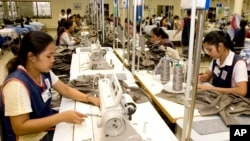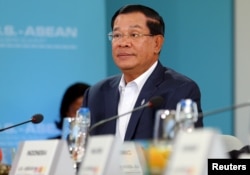Cambodian finance officials say they are now more closely studying membership in the U.S.-led Trans-Pacific Partnership, a regional trade pact that seeks to boost economic ties across the region.
Finance Secretary of State Vongsey Visoth recently told investors that Cambodia could not afford to ignore the opportunity even though the country is already negotiating with China to enter the Regional Economic Comprehensive Partnership.
The TPP study comes following talks between ASEAN leaders, including Prime Minister Hun Sen and U.S. President Barack Obama, in California last week.
Vongsey Visoth said the deal has not been ratified by U.S. lawmakers. Nevertheless, he added, member countries should start working together to build compatible regulations with other TPP members, on matters such as intellectual property and other regulations. ASEAN members Brunei, Malaysia, Singapore and Vietnam have signed onto the TPP.
Potentially great benefits
Chap Sothavrith, senior researcher at the Cambodia Institute for Cooperation and Peace, said Cambodia could benefit greatly from the TPP since potential members would encompass 40 percent of the world’s GDP. Cambodia's debt obligations to China wouldn't prove an impediment to joining TPP, he said, because the debt is manageable and “the deal has its own criteria.”
Cambodia has a foreign debt load of $5.9 billion, according to government figures, about 45 percent of which is owed to China.
Ou Virak, head of the Phnom Penh-based think tank Future Forum, said Cambodia shouldn't worry about sacrificing Chinese aid in considering joining TPP, as the U.S.-led pact would help Cambodia cut its reliance on China. “If it’s affected, it’s affected,” he said. “But if we are just afraid of being affected and don’t dare move… we’ll still be begging for money from China.”
He also said the TPP could, however, force some conditions on Cambodia, such as improving workers’ rights and adjusting protections for businesses and the environment.
“Being a part of the deal could force the government to make necessary reforms which can be beneficial to us,” he said.






